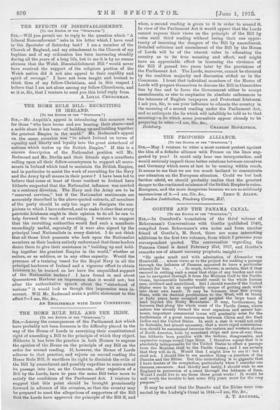GOETHE AND THE PANAMA CANAL. [To TEE EDITOR 01 TEE
"SrscuTon."1 SIR,—In Oxenford's translation of the third volume of Eekermann's Conversations with Goethe (published 1148), compiled from Eckermann's own notes and from another friend of Goethe's, M. Soret, there are some interesting additions to the first two volumes, from which I presume your correspondent quoted. The conversation regarding the Panama Canal is dated February 21st, 1827, and Goethe's remarks are of almost uncanny prophetic insight :— "He spoke much and with admiration of Alexander von Humboldt . • . whose views as to the project for making a passage through the Isthmus of Panama appeared to have a particular interest for him. '. . . So much, however, is certain, that if they succeed in cutting such a canal that ships of any burden and size can be navigated through it from the Mexican Gulf to the Pacific Ocean, innumerable benefits would result to the whole human race, civilized and uncivilized. But I should wonder if the United States were to let an opportunity escape of getting such work into their own hands. It may be foreseen that this young State, with its decided predilection to the West, will in thirty or forty years have occupied and peopled the large tract of land beyond the Rocky Mountains. It may, furthermore, be foreseen that along the whole coast of the Pacific Ocean, where nature has already formed the most capacious and secure har- bours, important commercial towns will gradually arise for the furtherance of a great intercourse between China and the East Indies and the United States. In such a case it would not only be desirable, but almost necessary, that a more rapid communica- tion should be maintained between the eastern and western shores of North America, both by merchant ships and men-of-war, than has hitherto been possible with the tedious, disagreeable, and expensive voyage round Cape Horn. I therefore repeat that it is absolutely indispensable for the United States to effect a passage from the Mexican Gulf to the Pacific Ocean ; and I am certain that they will do it. Would that I might live to see it! but I shall not. I should like to see another thing—a junction of the Danube and the Rhine. But this undertaking is so gigantic that I have doubts of its completion, particularly when I consider our German resources. And thirdly and lastly, I should wish to see England in possession of a canal through the Isthmus of Suez. Would I could live to see those throe great works ! It would be well worth the trouble to last some fifty years more for the very purpose."
It may be noted that the Danube and the Rhine were con-
mooted by the Ludwig's Canal in 1844.—I am, Sir, &a., A. T. ARUNDEL.






































 Previous page
Previous page